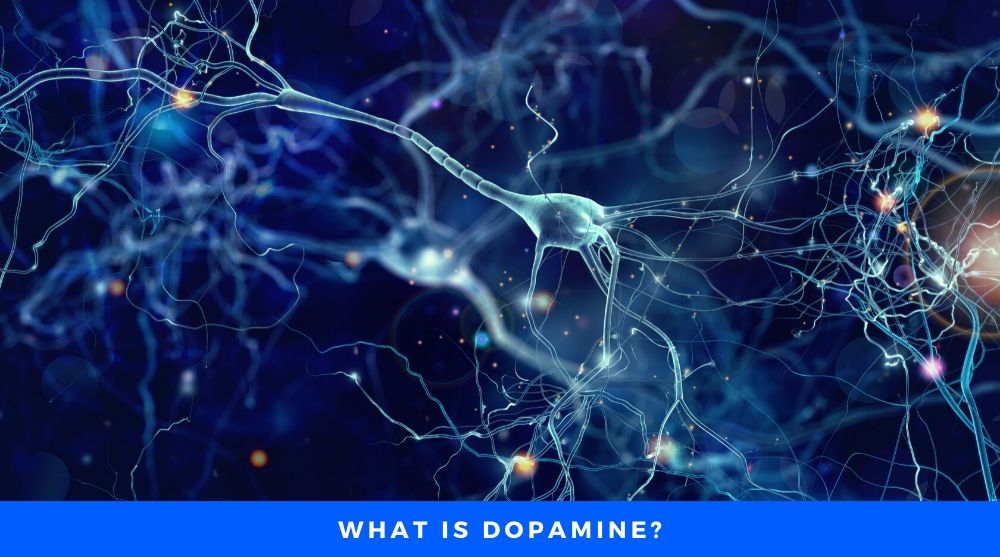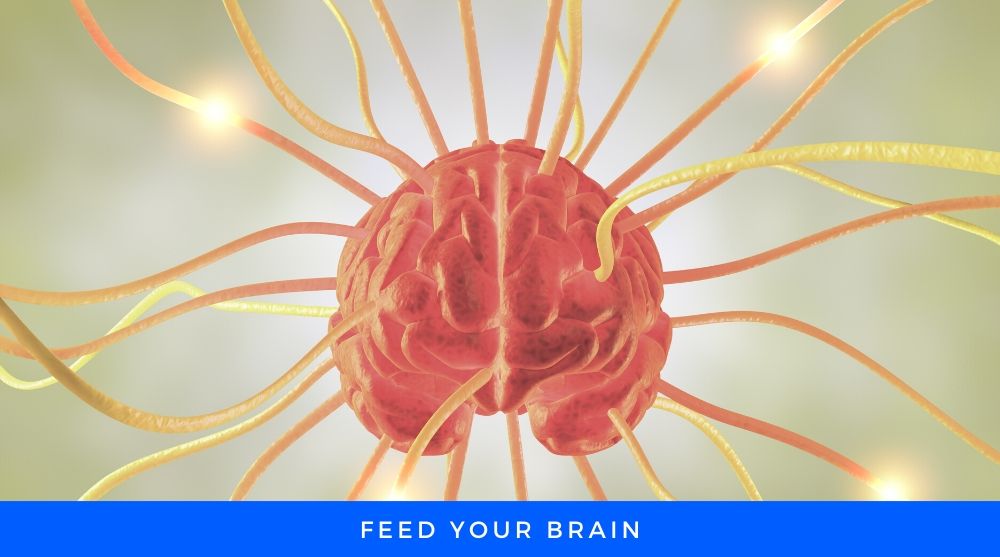Lifestyle has a profound influence on the health of one’s brain. The nourishment consumed, how much you exercise, how well you sleep, the way you socialize, and how you manage stress are all crucially important to your brain health.
At some point in your life you might have heard of the word “dopamine” from a friend, a family member or on the internet. Might have just brushed it off thinking of it to be a commonly used drug and to be honest that’s exactly what I had thought of. That’s when it sparked my interest and led me to dig deeper and learn everything about dopamine. I am thoroughly amazed by what I found and the role dopamine has in our lives; every moment and every choice you make.

What is dopamine?
Dopamine is an organic chemical found naturally in the human body. It is a neurotransmitter; they are chemical messengers that carry electrical signals between neurons in the brain. The concept of our happiness mostly depends on dopamine since it directly affects the pleasure and reward centers of the brain. It is correlated with satisfaction, motivation, appetite, sleep, libido, memory, and many more. As like every chemical in our body, improper nutrition and avoidance of care leads to dopamine deficiency.

Our brain is a funny thing, normally it will be very cooperative and easy to work with, other times it is uncooperative and obstinate refusing to get started. It is rebellious and brilliant, it can be your best friend and sometimes your worst enemy. Often times, what we typically own and enjoy are not treated with immense priority, because what is exciting there? Nothing. It’s the same things we see and do on a daily basis therefore it kind of fades away and does not really intrigue us anymore.

For example, say the first time you have ever boarded a plane, the excitement and enthusiasm is uncontainable and you end up gushing about your whole time on the plane for the next five weeks. It becomes a new story to tell. Another example goes for the one who has never been on a plane. Just seeing a plane fly across the sky is enough to raise their excitements and make their brain wonder ‘what does it feel like to be so high up in the sky?’ Hence when the brain processes things precisely in the moment, it uses a handful of chemical called the here and now chemical but our imaginary and abstract thought process is coordinated by one chemical: dopamine. The less familiar you are with the activity, the more likely your brain will reward you with dopamine. Dopamine is also known as the chemical of what you desire.

Do we run out of dopamine?
The answer to this question is a mixture of a yes and no, we can definitely lack producing dopamine but we do not completely run out of it. Scientists have proved us multiple of times that people who are overweight may have impairments in dopamine pathways, which could have been caused due to constant exposure to highly comestible (sugary and fatty) foods. Now, how is that bad and why does it have a counter reaction to dopamine? Well, everything in excess is bad for you. Fatty and sugary food, produces an excessive amount of unhealthy fat and clogs your brain which in result interferes in dopamine production. Same goes for the people who are extremely underweight, they tend to lack the adequate amount of nutrition a normal human being is supposed to giving rise to fatigue, lack of motivation which are common symptoms of dopamine deficieny.

Dopamine deficiency
Dopamine deficiency may be cause due to numerous of reasons such as existing conditions, drug abuse and an unhealthy diet.
Here are some symptoms of dopamine deficiency:
- Depression
- Chronic boredom
- Apathy
- Fatigue
- Low physical energy
- Lack of motivation
- Loss of satisfaction
- Mood swings
- Insomnia
- Hallucination
- Delusions
- Self-awareness
Low dopamine could also be linked to several mental illnesses but it does not directly cause these conditions such as: Schizophrenia and Parkinson’s disease

Although there is no reliable way to determine levels of dopamine in a human. There are some indirect ways to determine a dopamine level imbalance in the brain. Doctors can measure the density of dopamine transporters that correlate positively with nerve cells that use dopamine. This test involves injecting a radioactive material that binds to dopamine transporters, which doctors can measure using a camera. A doctor will also look at a person’s symptoms, his response to generic questions and tasks, lifestyle and medical history to determine low levels of dopamine.

Treatments depend on dopamine deficiency not related to mental health may include: counselling, a healthy diet, physical therapy for muscle stiffness and movement problem.
Not to worry though, everything lost can always be gained and taking a safer more natural way is everyone’s priority because it’s beneficial for our health in the future. Over the past years there has been several medication invented to treat dopamine deficiency but most contribute to treating symptoms of mental health conditions and as expected does have potential side effects, such as dizziness and insomnia. Doctors nowadays use prescription dopamine: Inotropin to treat low blood pressure.

At the end of the day, it is always best to resort to natural ways to restore dopamine.
Here are 10 natural ways you can revitalize dopamine:
1. Following the ‘Dopamine Diet’
The dopamine diet basically consists of food rich in tyrosine which is a precursor to dopamine; it helps increase the availability of dopamine in the brain. Eating a diet high in tyrosine can help ensure that you have the basic building blocks needed for dopamine synthesis.
This is a list of foods contained in the dopamine diet containing high amounts of tyrosine:
- Nuts: almonds, walnuts, peanuts etc etc.
- Dark chocolate
- Velvet beans
- Omega-3 rich fish such as salmon
- Unprocessed beef, chicken, turkey
- Vegetables . Quite literally veggies are a solution to every of our health problems. Concluding green leafy vegetables such as leeks, spinach and etc. Beetroots is another great source of tyrosine.
- Fruits : bananas, avocado, apple, fruits rich in vitamin-C
- Dairy products such as cheese, milk and yogurt
- Turmeric contains curcumin, which is thought to have antidepressant effects as it increases the release of dopamine

2. Exercise
Physical health is quite literally the utmost important thing for your brain. Regular exercise helps increase dopamine and releases endorphins; brains natural painkiller. Gives rise to antiaging brain cells making you visibly content and automatically enthusiastic.

3. Take dopamine enhancing supplements
There are supplements that are not a threat to your health such as:
- Probiotics help your body function properly.
- Mucuna Pruriens is a type of bean found in the native parts of Africa, India and Southern China.
- Gingko Biloba is a plant native to China which has been used as a natural remedy for various health conditions for hundreds of years.
- Curcumin is found in turmeric. It can separately be found in tea, capsules, extract and powdered form.
- Oregano oil has various antioxidants and antibacterial properties due to its active ingredient, carvacrol, which in turn promotes dopamine production
- Magnesium keeps your body and mind healthy
- Green tea contains the amino acid L-theanine, which directly affects your brain in increasing neurotransmitters, including dopamine
- Vitamin D regulates certain neurotransmitters like dopamine.
- Fish oil supplements contain two types of omega-3 fatty acids and improve mental health if taken regularly
- Ginseng roots can be eaten raw or steamed, it can also be found as capsules, tea or pills. Consuming ginseng may enhance brain skills, including mood, behavior and memory.
- Berberine has recently gained popularity in China as a natural supplement.
Along with eating a balanced diet, supplements also boost brain function and mental health. Each of the supplements in this list has a good safety profile when used properly but it is always best to consult your health advisor.

4. Meditation
Meditation build a more healthier and resilient brain by calming brain inflammation, increasing blood flow to the brain, reducing stress hormones, enhances brain plasticity and etc. Many studies have linked meditation to improved mental health.

5. Sleep well
Getting sufficient amount of sleep is the best way to feed your brain. Dopamine controls the sleep hormone called. Sleep gives the brain a chance to wash away toxin buidup throughout the day and keeps pathways active and constantly self-renewing. Melatonin and lack of sleep may reduce the number of dopamine receptors.

6. Listen to Music
Now, there is nothing better than swaying to the tunes of your favorite artists. Listening to a dear album automatically makes you happy since it makes you reminisce and relate. We find joy and pleasure in listening to music and as we all know all these feelings are stimulated by dopamine itself. So why not move our hips to our favorite songs and add this as a nonchalant way to increase dopamine production. Therefore, note to thy self “If music be the food of love, play on. Give me excess of it; that surfeiting, the appetite may sicken and so die.” –William Shakespeare.

7. Feed your brain
Dopamine rewards us when our rewards are met. We love the rush of dopamine because of the way it makes us feel. Challenge yourself with something new every day to intentionally stimulate dopamine release and when you have conquered it, treat yourself by calling up your closest friends to gush about it. Go shopping, watch a horror film to get your adrenaline rushing, the thrill is sensational. Indulge in activities that make you break a sweat and leave you flustered. At the end of the day when you reminisce, you will automatically be happy with what you have achieved.

8. Therapy
People often mistake therapy to be only for the ones with severe mental health disorders and that’s where they are wrong. Counselling is a form of therapy, seeking help does not title you mentally ill. Studies have shown that built up anger and emotions often lead to dangerous outcomes therefore having someone to talk to is very important for a person. Therapy often helps improve people’s mood and it is possible it can help raise one’s serotonin levels as well. Write your thoughts down in a piece of paper, however you may be feeling.

9. Reflect
Let go of the memories that hurt you and make you sad, you have one life and dwelling on sadness will not get you anywhere. Reminisce of the happier times you had or look through photographs of your childhood. Nostalgia makes you happy. Reflect on the goals you have achieved and the places you have been to. Revisit your memory lane. Have a heart to heart with your mother. Read a book about self-help. Look for opportunities to make you content and omit those upset you.

10. Donate
Give to the needy. Donate to an Ngo and visit once in a while. Seeing someone else be happy with your contributions is a feeling someone should definitely experience once in their lifetimes. Join a charity organization or adopt a pet. Have extra-curricular activities for entertainment purposes. For example: taking part in a play, doing a dance/music workshop. Any kind of new experiment like a new hobby or trying out a new recipe even though you fail miserably at it.

Last and foremost, always know when to stop, learn your limitations and embrace your boundaries. That way you will never go out of your way in the wrong path. Follow a routine that leads your lifestyle to success and do not falter and as we all know, healthy habits are habits of a happy brain. While these 10 methods take part in increasing dopamine naturally, they are not a substitute for medical care. Seek your doctor’s help and most importantly remember that there is no shame in taking medication or attending counselling. They are as common treatment options among many

More Posts
Top 8 Best Daily Planning For Entrepreneurs
Balancing work and personal life is crucial for entrepreneurs to maintain overall well-being and success. It allows entrepreneurs to avoid burnout, enhance productivity, and foster healthy relationships. Daily planning is organizing and prioritizing...
Things Successful Managers Can Do To Stay Productive
 Management is a challenging task and comes with its fair share of challenges. Being a good manager and balancing things adequately can be a daunting task; however, it can be navigated if...
10 Productivity Tips for Working Moms to Manage It All
Working moms handle a lot each day. They deal with jobs, home duties, and personal time. It's important for mothers to know how to manage their time well. This helps balance work and...
The Businessman & The Fisherman
An American businessman took a vacation to a small coastal Mexican village on doctor’s orders. Unable to sleep after an urgent phone call from the office the first morning, he walked out to...